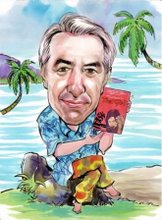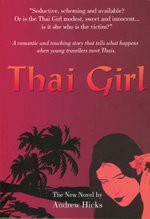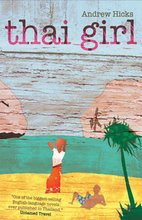


Publishing my first novel, “Thai Girl” was a great experience and I looked forward to reviews in the media anxiously. I needn’t have worried as the reviews were favourable but with one notable exception.
This one was to appear in one of Bangkok’s leading glossy magazines and I was looking forward to it most of all. The journalist in question had invited me to a Bangkok hotel and arrived with a photographer who took a series of pictures of me. We had a stimulating discussion of the book and while he made some searching comments, he said the book was far better than anything similar published locally. This review at least was in the bag, or so I thought.
But when it came out, the review was a general rant about ‘orientalism’ and various other tangential issues and concluded that the book was ‘far too late’, having been pre-empted as a portrait of backpackers in Thailand by Alex Garland’s “The Beach”.
Shortly after I was asked to lunch by the publisher of the magazine and he as good as apologized for an unfair review. He invited me to write a letter to the editor refuting the Alex Garland point, and having himself already read the book, planted a further ‘letter to the editor’ which slated the review and made some complimentary points about “Thai Girl”. It was all a very strange experience.
I’m telling you all this because one point the reviewer made sticks in my mind. In the book, Fon the ‘Thai girl’ tells her admirer, young British backpacker Ben all about her short but idyllic childhood in the rice fields of Buriram. My negative reviewer sneered at the possibility that a childhood in Isaan could ever be as idyllic as she made out to Ben.
No, of course it was never quite as idyllic as remembered by an exile like Fon who has migrated away to find work and is missing home and family. But idyllic an Isaan childhood nonetheless is, despite the doubts of my reviewer.
I see the children here around me in my Surin village and they enjoy a very happy childhood. Down the back sois of the village there are no cars and they’re free to wander out and play as they wish. It’s never cold and they can do what they like twelve months of the year. They can ride their bicycles, they can fall out of trees, play with the dogs, roll around in the dirt and do whatever they like and nobody ever says no. There’s always hosts of other kids to play with and they seem to be much nicer to each other than in the tough western playground.
There are no worries about paedophiles behind every tree, about being sued for every possible thing, about dirt and hygiene, or not playing with the rough children from the council estate. There are no formal meal times, no oppressive piano or ballet lessons, no nice clothes that might get spoiled, in fact no formalities or strictures whatsoever. True to the Thai principle of ‘sanuk’, kids are there to have fun.
Even our local school seems a pleasant haven for the slowest and sleepiest of all children. There are only ninety five children in all and the classes of about ten children are cozy and comfortable. The teachers are delightful and seem genuinely concerned that their charges should be happy, though there seems to be very little pressure on them to actually achieve. To push the children to do better would be unfair and might introduce stresses that could make them unhappy. Avoiding conflict, learning to be a part of the group and to be a responsible member of the school is far more important than academic achievement. Basic literacy and numeracy is enough if you are to spend your life in and around the village.
The countryside is beautiful and bountiful to live in too. After school the boys go out with their catapaults to catch birds to eat, the girls go and dig up crabs and rats from the rice fields in the dry season and during the rains, collect fish and shell fish from the flooded paddy fields.
There are lots of festivals to be enjoyed… weddings, house opening parties, public events such as the King’s birthday and the several days set aside for sports in competition with the school in the next village. Football, running, sack races and a tug of war are all good excuses to suspend lessons for a few days and to do something that’s much more fun. However small you are, there are prizes to be won and in the gold medal you’re given on the rostrum, there’s a twenty baht note.
It’s a wonderful village atmosphere of a kind that has disappeared in the industrialized West. Your family has been here for several generations, granny is here living with you and aunts and uncles are next door. Somehow you’re related to almost everyone and while there are some vicious feuds rumbling on, generally everyone pulls together if somebody hits hard times.
Life on the land is everyone’s shared experience and the pressures of planting the rice and of bringing it home create an annual and reassuring cycle of life that comes to a climax with celebration of the harvest. It’s tough out there in the rice fields but there’s always a big gang of people and there’s good food, flirting and fun to be had, while the children play around in their own innocence.
It’ll be tough when all too soon they have to grow up, so childhood seems to have been and truly was a rural idyll. Free of all the worries of adult life, of having no money, of the rains being late, of paying the interest on the debt incurred to buy fertilizer and seeds, free of the problems of gambling and drink, of philandering and feckless husbands, childhood in Isaan is truly an idyll of the fields.
There are many problems too the adults. Agriculture is in crisis, Mama Papa have gone away to work so the family is broken up, but still the money trickles back and there’s always Grannie and uncle as reliable stalwarts who are always there. Life goes on and the children are always spared the strain.
If only there was a sustainable living to be had. If only there was some small industry in the local town to provide jobs locally so that Mama could live at home. If so, childhood in Isaan would not only seem to be an idyll; it truly could be near perfect.
For Fon, the ‘Thai girl’ who was sent to work in Bangkok aged ten when her father was killed and the family made destitute, what she told Ben was right. Looking back, it must indeed have seemed an idyllic childhood. My one negative reviewer please take note if you’re still around!





4 comments:
As is your wonderful book, this posting is well-written, insightful, and, oddly enough, nostalgia-inducing, even for someone such as I who grew up long ago and far away from Isaan. J.A. Paulos
It made me miss my childhood home a lot! Please write more about Isaan.
http://www.thaiescortgirl.blogspot.com/
Wonderful observations of village life. My first Thai girl friend worked in Bangkok and had a daughter back in the village. At first I thought this was sad and almost wrong – leaving your child behind. But when experienced the village life and saw the life the children have – with their extended families. And I thought about the alternative latch key & day care type life in Bangkok while mom works long days 6 days a week. The village came to seem the right place for a child to group up. You have done a nice job of capturing the essence of this.
Is Thai Girl available in .pdf or another electronic format? I have a problem with my vision and it's easier to read if I can adjust the text but I'd love to read the book.
J
oldsport@gmail.com
Post a Comment